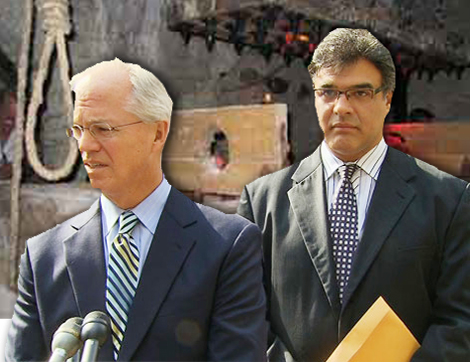
By Richard Walker
Under Presidents Bush and Obama, no one has gone to prison for torturing people, destroying evidence about it or writing memos advocating it. But talking about how torture does not work will lead to you being tried as an enemy spy. That is where 48-year-old John Kiriakou, a former Central Intelligence Agency (CIA) agent, now finds himself for speaking with a journalist about waterboarding a terrorism suspect.
Waterboarding involves holding down a person and pouring water into their open nose and mouth, effectively drowning him. It is a practice banned under the Geneva Conventions but that has not stopped the CIA from waterboarding individuals accused of terrorism. It is not known how many suspects were subjected to this and other torture methods in CIA black sites across the globe since 9-11, but Khalid Sheikh Mohammed, the supposed mastermind of 9-11, was waterboarded 183 times before he supposedly “confessed” to orchestrating the September 11 attacks.
For breaking the wall of silence surrounding torture, Kiriakou will spend the next 30 months behind bars. The judge said if he had not agreed to a plea deal she would have sent him away for a very long time. He was only offered the plea deal after charges against him under the World War I Espionage Act of 1917 were replaced with ones under the 1982 Intelligence Identities Protection Act, which carried a minimum prison term. Had the previous charges remained he might have been sent away for life.
When he was first charged under the older law, his supporters were shocked. The Espionage Act was originally designed to deal with those who aided and abetted enemies of the United States. Kiriakou’s lawyers argued he was no such enemy. Instead, he was a decorated undercover agent, who had spent years overseas.
So what exactly did Kiriakou do to put himself in the crosshairs of the Obama administration?
Prosecutors alleged that Kiriakou spoke to a journalist about the waterboarding of “al Qaeda operative,” Abu Zubayda, in 2002. In doing so, he revealed the name of a CIA operative. That information then found its way to lawyers representing suspects at Guantanamo, who were arguing they too were tortured. That does not fully explain why Obama and his Justice Department (DoJ) went after Kiriakou with the kind of zeal not evident in their treatment of other whistle-blowers.
The reality is Kiriakou put the spotlight on Obama, the CIA and his DoJ.
By speaking openly as he did about torture, saying it had achieved little in the way of intelligence, he embarrassed the CIA and White House when they were trying to ignore the issue, hoping it would go away.
Richard Walker is the pen name of a former N.Y. news producer.

